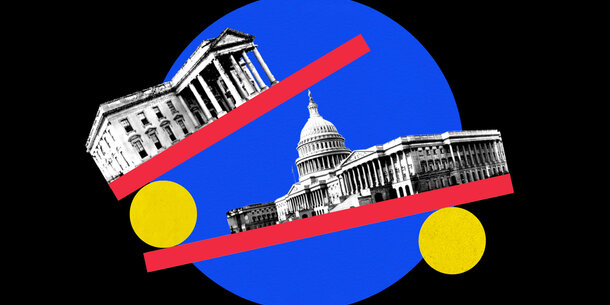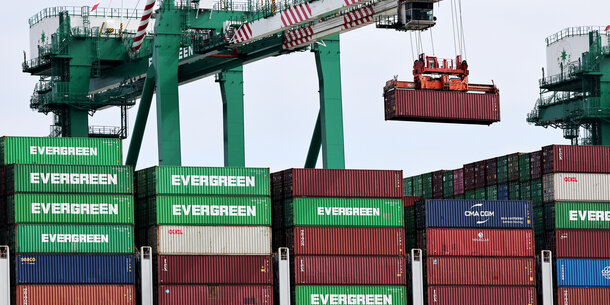President Trump issued a proclamation last week banning many new immigrants, claiming that they would take Americans’ jobs as the economy recovers. But the exceptions in the ban show that its true purpose is to simply stop as many people as possible from becoming Americans. This has been Trump’s stated desire for years, and now he is using the coronavirus pandemic as a screen to drive it forward.
White House adviser Stephen Miller admitted as much in a leaked private call with Trump supporters about the order, reportedly saying, “The first and most important thing is to turn off the faucet of new immigrant labor — mission accomplished.” The new order has an initial period of 60 days, but the Washington Post reported that Miller “indicated that the strategy is part of a long-term vision and not seen only as a stopgap.”
The proclamation broadly bars people overseas from getting green cards that would allow them to permanently live and work in the United States. It exempts spouses and children of U.S. citizens, who accounted for about 20 percent of immigrants from overseas in 2019. Also left out are health professionals and investors, among others. But it does, for example, ban the spouses and children of permanent residents, as well as others close to American citizens, like fiancées, parents, and siblings.
With tens of millions of people losing their jobs in less than a month, easing the pain of the economic devastation from the virus is an imperative. But this proclamation does both too much and too little to achieve that goal, revealing that it is a pretext to keep immigrants out of the United States.
First, the ban on permanent work visas doesn’t do more to protect American workers than existing rules do. Most work visas already require the Department of Labor to certify that Americans can’t do the job in question and that hiring a foreigner won’t push wages down for similar jobs. Trump’s order claims that this process can’t account for economic conditions in light of the coronavirus — without explaining why or considering whether the process could be made stricter.
Perhaps the administration is assuming that the current unemployment situation means that Americans might now be willing to do jobs that they normally wouldn’t. Even taking that as true, it doesn’t explain why the order doesn’t affect temporary work visas, of which over 900,000 were issued in 2018 (permanent work visas are capped at 140,000 a year). Or why it wouldn’t apply to people working in the United States on temporary visas who want a green card to become permanent residents.
In any case, most permanent work visas are for people that meet significant education and training requirements. For example, the first 40,040 such visas every year are reserved for people with “extraordinary ability in the arts, science, education, business, or athletics; outstanding professors and researchers; and certain multinational executives and managers.” Only 10,000 are available for “unskilled” workers who can meet certification requirements, or 0.05 percent of the number of newly unemployed people in the country.
The ban makes a lot more sense if it’s intended to keep people from making America their new home. That’s what best explains why permanent work visas are banned while temporary ones are allowed. And why it targets the families of immigrants, or the “chain migration” the president derides, even when many people in this category — like older parents of U.S. citizens or the children of permanent residents — wouldn’t be working at all.
After all, a focus on stopping permanent residents is a common thread through the president’s policies. The Muslim ban, for example, goes easier on visitors than it does on the relatives of Americans from the affected countries, even though the ban’s supposed purpose was for “security,” and people wanting to live in the United States undergo more rigorous screening. The president has made no secret of his desire to get rid of birthright citizenship enshrined in the 14th Amendment, and he established a “denaturalization” task force to identify American immigrants whose citizenship should be stripped.
While the new proclamation will almost certainly be challenged in court, the Supreme Court’s historically bad decision in Trump v. Hawaii — the case upholding the Muslim ban — presents an obvious obstacle. Both that ban and the new one were ordered under a section of the Immigration & Nationality Act that allows the president to indefinitely bar people from the United States whenever he finds they would be “detrimental” to U.S. interests. In Hawaii, the Court found the provision’s language to “exude[] deference to the President in every clause.”
But there are differences. For one thing, the Supreme Court might be leery of permitting the Trump administration to repeatedly exploit a provision clearly intended to implement discrete foreign policy decisions — like sanctions — and deal with emergencies to put in place a system where the president can pick and choose who can come to the United States based on favoritism or expediency. This subverts the rules Congress — which under the Constitution properly determines who can become an American citizen — has written in the law.
In addition, the Muslim ban only survived legal scrutiny after the administration carried out an inter-agency review that reverse engineered a record supporting the ban. It is not clear that any such review was undertaken for the most recent ban.
Further, the new order will have little practical effect in the near term because the coronavirus has already shut down most travel and other immigration processes. Routine visa services are suspended at U.S. consular outposts across the globe, so no one is looking at applications anyway. And many of those already approved for green cards or visas may find it tough to come here because the Canadian and Mexican borders are essentially closed, and foreigners traveling from much of the European Union, China, and the United Kingdom are barred.
Given that the order aligns with administration priorities that have nothing to do with the coronavirus, there is a real risk that it will become permanent. The first Muslim ban was described as temporary and continues to this day. Indeed, further restrictions may be in the works, as intimated by Acting Homeland Security Secretary Chad Wolf and Stephen Miller.
There’s no doubt that a president needs to be able to quickly and effectively respond in a time of crisis like the one we currently face. But an emergency shouldn’t be an excuse to implement policies that violate our core commitment to the rule of law.



